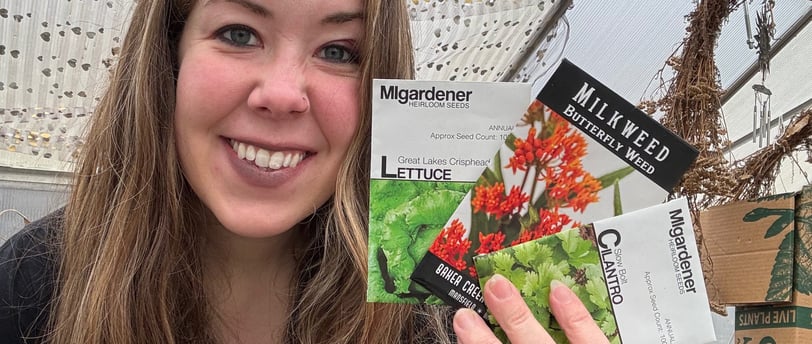How To Source Seeds For Your Garden
An overview of popular seed sourcing methods to help you build your perfect garden.
SEED STARTINGGARDEN PLANNING
1/30/20253 min read


Shopping for or swapping seeds is one of the most exciting parts of gardening. With so many options available, from seed libraries to online stores, sourcing seeds can be as rewarding as planting them. Here’s an overview of popular seed sourcing methods to help you build your perfect garden.
---
Buying Seeds from Reputable Suppliers
Purchasing seeds from trusted suppliers ensures quality and reliability. Many seed companies provide heirloom, organic, and hybrid varieties for gardeners of all levels.
Popular Online Seed Suppliers:
- Burpee ([burpee.com](https://www.burpee.com)) – Reliable for vegetables, flowers, and herbs.
- Johnny’s Selected Seeds ([johnnyseeds.com](https://www.johnnyseeds.com)) – Excellent for heirloom and organic options.
- Baker Creek Heirloom Seeds ([rareseeds.com](https://www.rareseeds.com)) – Known for rare and unique heirloom varieties.
- High Mowing Organic Seeds ([highmowingseeds.com](https://www.highmowingseeds.com)) – Specializes in certified organic, non-GMO seeds.
- MIgardener ([migardener.com](https://www.migardener.com)) – Affordable heirloom seeds at $2 per pack.
- True Leaf Market ([trueleafmarket.com](https://www.trueleafmarket.com)) – Offers seeds for microgreens, sprouts, and organic vegetables.
Tips for Buying Seeds:
- Look for seeds suited to your growing zone.
- Choose disease-resistant varieties if pests or diseases are common in your area.
- Check reviews and customer feedback before purchasing.
---
Exploring Seed Libraries
A seed library is a community-driven initiative where members can "borrow" seeds, plant them, and return seeds from their harvest at the end of the season. This promotes biodiversity and sustainable gardening practices.
How Seed Libraries Work:
1. Borrow seeds for free or a small membership fee.
2. Grow the plants and save seeds from your best specimens.
3. Return the seeds to the library for others to use.
Benefits of Seed Libraries:
- Access to regionally adapted seeds.
- Encourages local biodiversity.
- Fosters a sense of community among gardeners.
To find a seed library near you, check local libraries, community centers, or organizations like [Seed Libraries](https://seedlibraries.org).
---
Participating in Seed Swaps
Seed swaps are events where gardeners exchange seeds. These can be in-person gatherings or virtual events hosted by gardening communities.
How to Participate in a Seed Swap:
1. Gather seeds you’ve saved or extras you’ve purchased.
2. Label each packet with the plant name, variety, and growing tips.
3. Share and exchange with other gardeners.
Online Seed Swaps:
- Reddit’s r/seedswap – A vibrant online community for exchanging seeds.
- Facebook Groups – Many local and regional gardening groups host virtual seed swaps.
Always use discretion when joining online swaps and sharing your mailing address!
Why Seed Swaps Are Great:
- Gain access to unique and rare varieties.
- Save money by exchanging instead of buying.
- Build connections with fellow gardeners.
---
Saving Seeds from Your Garden
Saving seeds is a cost-effective way to ensure a sustainable garden. It also helps preserve heirloom varieties and adapt plants to your local environment.
How to Save Seeds:
1. Choose the Right Plants: Select healthy, disease-free plants for seed saving. Heirloom and open-pollinated varieties are best.
2. Harvest Seeds: Allow fruits or flowers to fully mature before collecting seeds. For example:
- Tomatoes: Scoop seeds, ferment to remove gel coating, rinse, and dry.
- Beans: Let pods dry on the plant, then shell and store seeds.
- Flowers: Collect seeds once blooms fade and seed heads dry out.
3. Store Seeds Properly: Keep seeds in a cool, dry place in labeled envelopes or jars.
Benefits of Saving Seeds:
- Reduces gardening costs.
- Creates plants adapted to your local conditions.
- Preserves rare or heirloom varieties.
Whether you’re buying from trusted suppliers, borrowing from a seed library, swapping with fellow gardeners, or saving your own seeds, sourcing seeds is an essential part of the gardening journey. These methods not only help you grow a thriving garden but also build connections with the gardening community and contribute to biodiversity. Happy seed shopping!
Videos all about SEEDS!





